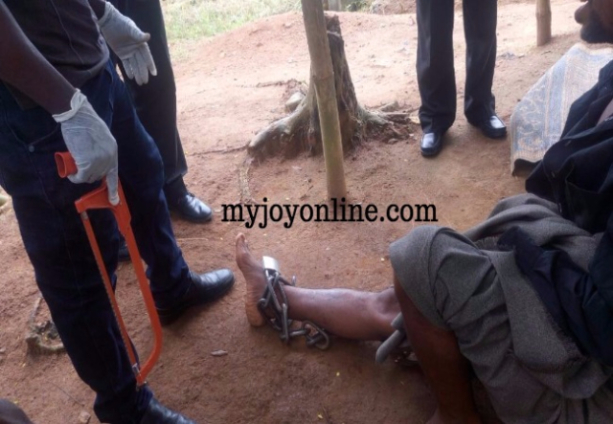Thousands of people with mental health conditions are chained around the world with some, as young as 10 years, confined for weeks, months and even years against their will, the Human Rights Watch Report has said.
The Report, which was launched virtually, ahead of this year’s World Mental Health Day on October 10, indicated that men, women, and children, were chained or locked in confined spaces in about 60 countries across Asia, Africa, Europe, the Middle East, and the Americas.
The 56-page Report: “Living in Chains: Shackling of People with Psychosocial Disabilities Worldwide,” examines how people with mental health conditions are often shackled by families in their own homes or in overcrowded and unsanitary institutions, against their will, due to widespread stigma and a lack of mental health services.
“Many are forced to eat, sleep, urinate, and defecate in the same tiny area," it said.
“In state-run or private institutions, as well as traditional or religious healing centres, they are often forced to fast, take medications or herbal concoctions, and face physical and sexual violence."
The Report includes field research and testimonies from Ghana, Afghanistan, Burkina Faso, Cambodia, China, Indonesia, Kenya, Liberia, Mexico, Mozambique, Nigeria, Sierra Leone, Palestine, South Sudan, Yemen and the self-declared independent state of Somaliland.
“Shackling people with mental health conditions is a widespread brutal practice that is an open secret in many communities,” said Kriti Sharma, Senior Disability Rights Researcher at Human Rights Watch (HRW) and author of the Report.
“People can spend years chained to a tree, locked in a cage or sheep shed because families struggle to cope and governments fail to provide adequate mental health services.”
The Report said while a number of countries were paying greater attention to the issue of mental health, shackling remains largely out of sight.
It noted that there were no data or coordinated international or regional efforts to eradicate shackling.
The Report said in response, the HRW had been working with mental health advocates with live experiences, and human rights and anti-torture organisations around the world to launch a global #BreakTheChains campaign to end shackling of people with mental health conditions.
The HRW interviewed more than 350 people with psychosocial disabilities, including children, and 430 family members, staff working in institutions, mental health professionals, faith healers, government officials, and disability rights advocates.
Based on a study of 110 countries, HRW found evidence of shackling of people with mental health conditions across age groups, ethnicities, religions, socioeconomic strata, and urban and rural areas in about 60 countries.
It said globally, an estimated 792 million people, or one in 10, including one in five children, had a mental health condition.
“Yet governments spend less than two per cent of their health budgets on mental health.”
The report said even when mental health services were free or subsidized, distance and transport costs were a significant barrier.
It said in the absence of proper mental health support and lack of awareness, many families felt they had no option but to shackle their relatives; stating that they were often worried that the person might run away or hurt themselves or others.
The report urged national governments to act urgently to ban shackling, reduce stigma, and develop quality, accessibility and affordable community mental health services.
Governments should immediately order inspections and regular monitoring of state-run and private institutions and take appropriate actions against abusive facilities, the Report said.
Latest Stories
-
Supreme Court acted right in throwing out suspended CJ’s supplementary affidavit – Ansa-Asare
11 minutes -
Resignation is a personal choice, not a necessity – Spio-Garbrah on Chief Justice suspension
31 minutes -
Joy FM’s 6th Showbiz Roundtable to highlight mental health of creatives
34 minutes -
Minister assures investors of regulatory stability in energy sector as offshore drilling resumes
35 minutes -
Deputy Minority Leader demands clarity on privately financed presidential and vice presidential travels
37 minutes -
Prof Baffour Agyeman-Duah: Protecting our independent governance institutions
44 minutes -
Ashok Mohinani honoured with CEO Excellence Award in the Poly Product-Tank Sector
45 minutes -
Ghanaian teacher wins 2025 global Cambridge Dedicated Teacher Award
47 minutes -
Ayariga commends Foreign Affairs Minister for swift action on Washington Embassy incident
50 minutes -
Occupants of Church built on Lashibi Ramsar site given 1-week to pack out before demolition
59 minutes -
Mpox concerns heighten as Ashanti Region tests 10 suspected cases
1 hour -
Ghanaian students to access education, jobs in Germany through new university partnership
1 hour -
UNFPA embarks on free obstetric fistula surgeries for underprivileged women in five major hospitals
1 hour -
Chinese and Malaysian nationals arrested over suspected cyber-crime activities in Weija
1 hour -
Useless Column: Ghana to spoil Nigeria’s jollof?
1 hour

